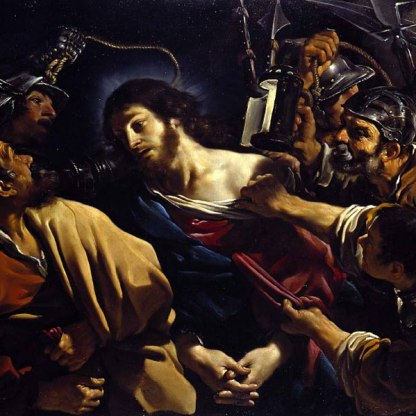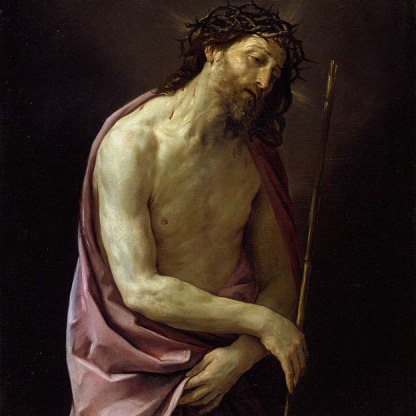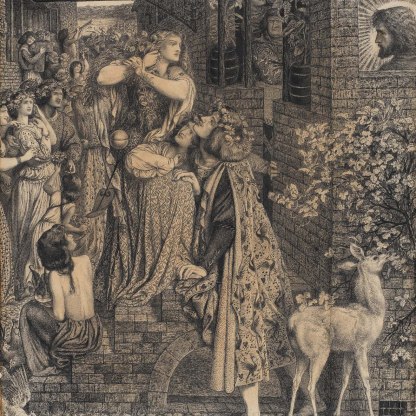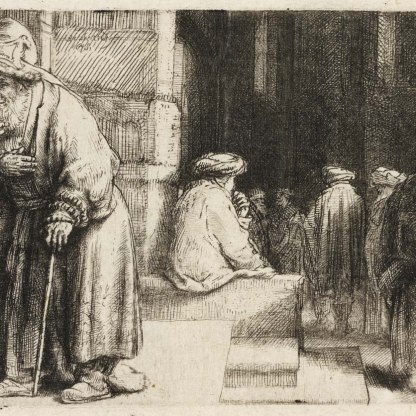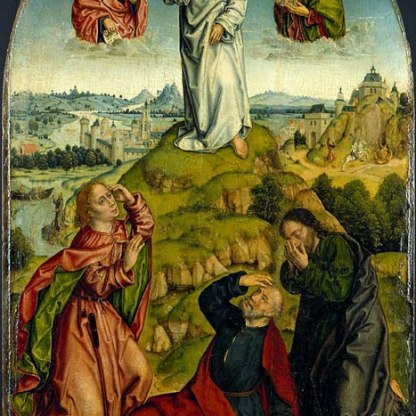Judas
As they sat and did eat, Jesus said, Verily I say unto you, One of you shall betray me.
And they began to be sorrowing, and to say unto him one by one, Is it I? And another said, Is it I?
And he answered and said unto them, It is one of the twelve, that dippeth with me in the dish.
The Son of man indeed goeth, as it is written of him: but woe to that man by whom the Son of man is betrayed! Good it were had that man never been born.
Mark, 14, 18–21
Even today, the very name Judas is a by-word for false friendship and treachery, a treachery all the more odious for its being conducted through a kiss. But the quotation above allows the reader to feel some degree of sympathy with Christ's betrayer, such as Guercino seems to suggest in his painting. The traitor faces eternal damnation, but his treachery is part of a much larger, pre-ordained plan – 'the Son of Man indeed goeth, as is written of him'. Jesus must be crucified, therefore Judas must betray him.
John, 13, 2, seems almost to relieve Judas of his free will when he talks of 'the devil having now put into the heart of Judas Iscariot, Simon's son, to betray him'.
Matthew, 26, 47–56, describes the moment painted by Guercino as follows:
And while he yet spake, lo, Judas, one of the twelve, came, and with him a great multitude with swords and staves, from the chief priests and the elders of the people.
Now he that betrayed him gave them a sign, saying, Whomsoever I shall kiss, that same is he: hold him fast.
And forthwith he came to Jesus, and said, Hail, master; and kissed him. And Jesus said unto him, Friend, wherefore art thou come?
Then came they, and laid hands on Jesus, and took him.
And, behold, one of them which were with Jesus stretched out his hand, and drew his sword, and struck a servant of the high priest's, and smote off his ear.
Then said Jesus unto him, Put up again thy sword into his place: for all they that take the sword shall perish with the sword.
Thinkest thou that I cannot now pray to my Father, and he shall presently give me more than twelve legions of angels? But how then shall the scriptures be fulfilled, that thus it must be?
In that same hour Jesus said to the multitudes, Are ye come out as against a thief with swords and staves for to take me? I sat daily with you teaching in the temple, and ye laid not hold of me.
But all this was done, that the scriptures of the prophets might be fulfilled. Then all the disciples forsook him, and fled.
In the New Testament there are two almost contradictory accounts about what happens to Judas after Christ's arrest. Matthew, 27, 3–8, suggests, as Guercino does, that he repents of his actions:
Then Judas, which had betrayed him, when he saw that he was condemned, repented himself, and bought again the thirty pieces of silver to the chief priests and elders,
Saying, I have sinned in that I have betrayed the innocent blood.
And they said, What is that to us? See thou to that.
And he cast down the pieces of silver in the temple, and departed, and went and hanged himself.
And the chief priests took the silver pieces and said, It is not lawful for to put them into the treasury, because it is the price of blood.
And they took counsel, and bought with them the potters' field, to bury strangers in.
Wherefore that field was called, The field of blood, unto this day.
But the Acts of the Apostles, 1, 16–20, allows Judas no such change of heart, and his death is far stranger and bloodier than a repentant sinner's suicide:
Men and brethren, this scripture must needs have been fulfilled, which the Holy Ghost by the mouth of David spake before concerning Judas, which was guide to them that took Jesus.
For he was numbered with us, and had obtained part of this ministry.
Now this man purchased a field with the reward of iniquity; and falling headlong, he burst asunder in the midst, and all his bowels gushed out.
And it was known unto all the dwellers at Jerusalem; insomuch as that field is called in their proper tongue, Aceldama, that is to say, The field of blood.
For it is written in the book of Psalms, Let his habitation be desolate, and let no man dwell therein.
Later writers generally followed the unrelenting tone of Acts in their accounts of Judas' fate, both before and after the betrayal of Christ. In Dante's Inferno, canto 34, Judas is at the very centre of Hell, flanked by two other arch-traitors, Brutus and Cassius (the killers of Julius Caesar), stuffed head first into the middle of Satan's three mouths, having his flesh constantly ripped from him, but never being allowed to die.
Papias, a second-century bishop of Hierapolis in Phrygia (in modern Turkey), also denies Judas a quick and simple passing. Indeed he spares the traitor no indignity:
As a great example of impiety, Judas walked about in this world. He was so swollen in his body, that where a wagon could go through easily, he could not go through; nay, he could not even insert the mass of his head. His eyelids were so swollen, it is said, that he could not see the light at all, nor could his eyes be seen even with an optical instrument; so deep did they lie from the surface.
His genitals were repellent and huge beyond all shamelessness. From his whole body flowed blood mixed with worms, which exuded particularly during his natural needs.
After many trials and sufferings they say, he died in his own place, which, because of the stench, has remained deserted and unhabitable to the present day. Until today, no one can pass by that place without holding his nose. So great was the exudation from his body that spread over the ground.
A saga from the middle ages seems to mix Judas up with the tragic Greek hero Oedipus, and has him inadvertantly kill his father and marry his mother, before realising his mistake and, out of remorse, joining Jesus.
More sinisterly the crime of Judas has been used to justify anti-Semitic sentiment throughout history. Pope Gelasius I in the fifth century wrote, 'In the Bible, the whole is often named after the part: as Judas was called a devil and the devil's workman, he gives his name to the whole race.'
In medieval passion plays, Judas was often portrayed as a grotesque Jew.
Other highlight objects you might like
Other pathways and stories you might like
Sign up to our emails
Be the first to hear about our news, exhibitions, events and more…

